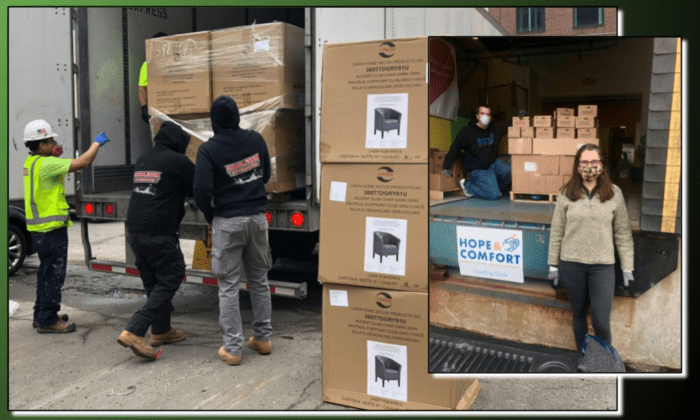
“We were realizing what a big problem this is. We needed to take a larger, more system-based response to it.”
On March 26, Massachusetts Governor Charlie Baker announced that an old state-owned hospital would reopen as a resource for COVID-19 patients who do not have a place to live. By that point, shelters around Boston had begun to report coronavirus cases in the system.
Weeks earlier, Joshua Barocas, an infectious disease physician at Boston Medical Center (BMC), and colleague Miriam Komaromy, medical director of BMC’s addiction center, were already worried about the potential spread that could occur among the state’s homeless population.
Fast-forward to last week, and the East Newton Pavilion, which formerly held up to 250 patients at a time, was housing about 150 COVID-19 patients and preparing for more as the state hovered through a surge in positive cases.
“We’ve been putting together a scale-up plan for the East Newton Pavilion, which includes opening up the second floor, getting staffing, and making sure that we have personal protective equipment (PPE),” Barocas said.
The South End building close to I-93 is equipped with three wings, nurse stations, and a security system. Barocas said those running the facility are essentially providing “shelter-level care,” meaning that patients take their own medications if possible, and can move around freely. Patients are also served three meals a day, have private bathrooms, and are separated by whatever gender they identify as—similar to most area shelters.
“It’s a COVID-positive ward, meaning we encourage patients to wear masks, but at the end of the day they are all positive,” Barocas said. “All staff are in full PPE, including the admissions staff, including the security as well as all of the medical staff.”
The goal is to keep people who cannot go home away from others who could contract a highly contagious strain of coronavirus. For several weeks, Barocas and Komaromy thought about ways to help the most vulnerable members of society during the pandemic, including those struggling with substance abuse disorders.
Komaromy said the need for a physical structure became apparent when the Boston Health Care for the Homeless Program (BHCHP) started pitching isolation and quarantine tents for people exposed to the virus.
“We were realizing what a big problem this is,” Komaromy said. “We needed to take a larger, more system-based response to it.”
Living in tight quarters among others while dealing with the virus presented a risk to people experiencing homelessness, so she and Barocas raised the idea to reopen the East Newton Pavilion as a way to house at-risk folks.
Now, the facility is seeing a large and growing population of elderly patients, as well as people who have compromised immune systems or other health conditions that make them more susceptible to the virus and unable to live at home. The majority of patients, though, are homeless. Some arrived feeling ill, while others showed minimal symptoms.
Regarding daily routines, Komaromy said many are healthy enough to be discharged from a hospital, but too sick to be out on the streets or in a shelter leaves them with little options. She describes most patients as being calm and easy to work with, spending a lot of time relaxing, watching TV, or reading.
“The folks who we are providing care for are people who, if they had a home, they would be told to go home and wait to get better,” Komaromy said. “This unit gives people a comfortable place to stay and get better. And it also prevents people from making other people sick, because everybody here on this unit has the COVID infection.”
Patients are required to stay at the facility until they are cleared from their infection, according to Centers for Disease Control and Prevention guidelines. Some may need to show that they have no symptoms for seven days or 72 hours in order to be cleared for release.
“A certain period of time has to pass since someone is symptom-free, and some people get retested to make sure that there’s no active virus,” Barocas said. “In simple terms, you are either cleared because you don’t have any symptoms, or you’re cleared because you get retested.”
Testing more members in vulnerable populations and separating them from others may be key to slowing the spread of the virus, according to many public health experts. Shelters in downtown Boston and other cities throughout New England started offering accessible tests weeks ago, as soon as they became available.
Barocas said the East Newton Pavilion has been “a crucial pop-up valve” for hospitals and shelters in the area, but noted that there is still a need for more protective equipment, staff, and tests at his facility and similar locations like the Boston Convention and Exhibition Center and Barbara McInnis House in the South End, both of which are serving vulnerable populations.
“We need absolutely more testing, and we also need more staff … at the end of the day, as long as those three components (of space, staff and stuff) are together, then we have a good system that has been put together to accommodate this population,” Barocas said.
There has been some progress. The City of Boston, for example, recently announced universal testing for its homeless population. Shelters, though, aren’t the only settings that are impacted, Barocas said. Those with substance abuse disorders living in residential facilities, as well as people in domestic violence shelters and other group homes, are also at risk of exposure.
“Universal testing, as it is now, is a one-time test,” Barocas said, “but the test is imperfect, and people might become infected after the round of universal testing.”
This article was produced in collaboration with the Boston Institute for Nonprofit Journalism as part of its Pandemic Democracy Project.
HELP DIGBOSTON WEATHER THIS STORM AND CONTINUE PROVIDING ARTICLES LIKE THIS ONE
Jordan is a journalist with 7 News and a past president of Society of Professional Journalists-New England.

